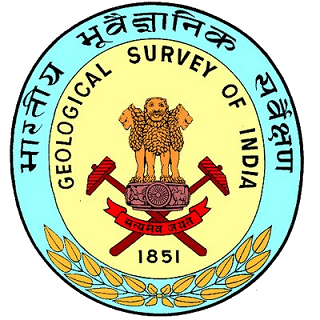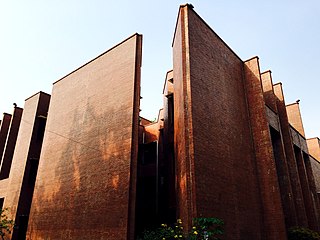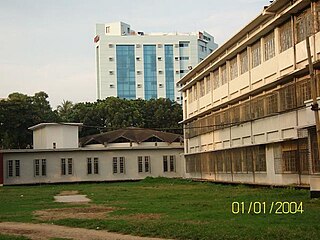Related Research Articles

The Geological Survey of India (GSI) is a scientific agency of India. It was founded in 1851, as a Government of India organization under the Ministry of Mines, one of the oldest of such organisations in the world and the second oldest survey in India after the Survey of India, for conducting geological surveys and studies of India, and also as the prime provider of basic earth science information to government, industry and general public, as well as the official participant in steel, coal, metals, cement, power industries and international geoscientific forums.

In 1971, the Pakistan Army and their local collaborators, most notably the extreme right wing militia group Al-Badr, engaged in the systematic execution of Bengali intellectuals during the Bangladesh Liberation War of 1971. Bengali intellectuals were abducted, tortured and killed during the entire duration of the war as part of the 1971 Bangladesh genocide. However, the largest number of systematic executions took place on 25 March and 14 December 1971, two dates that bookend the conflict. 14 December is commemorated in Bangladesh as Martyred Intellectuals Day.

Sitakunda is an upazila in the Chattogram District of Chattogram Division, Bangladesh. It includes one urban settlement, the Sitakunda Town, and 10 unions. Sitakunda is the home of the country's first eco-park, as well as alternative energy projects, specifically wind energy and geothermal power.
Parbatipur is an upazila (sub-district) of the Dinajpur District in northern Bangladesh, part of the Rangpur Division. It is home to the only mine in Bangladesh, the Barapukuria Coal Mine.

The Geology of Bangladesh is affected by the country's location, as Bangladesh is mainly a riverine country. It is the eastern two-thirds of the Ganges and Brahmaputra river delta plain stretching to the north from the Bay of Bengal. There are two small areas of slightly higher land in the north-centre and north-west composed of old alluvium called the Madhupur Tract and the Barind Tract, and steep, folded, hill ranges of older (Tertiary) rocks along the eastern border.

The Asiatic Society of Bangladesh is a non political and non profit research organisation registered under both Society Act of 1864 and NGO Affairs Bureau, Government of Bangladesh. The Asiatic Society of Bangladesh was established as the Asiatic Society of East Pakistan in Dhaka in 1952 by a number of Muslim leaders, and renamed in 1972. Ahmed Hasan Dani, a noted Muslim historian and archaeologist of Pakistan played an important role in founding this society. He was assisted by Muhammad Shahidullah, a Bengali linguist. The society is housed in Nimtali, walking distance from the Curzon Hall of Dhaka University, locality of Old Dhaka.

The National Library of Bangladesh is the legal depository of all new books and other printed materials published in Bangladesh under the copyright law of Bangladesh. It was founded in 1973, but it traces its origins back to 1967, before the Bangladesh Liberation War and its independence. It is open to general public and has both Bengali and English language books. It is housed in the National Library Bhaban.

Bangladesh's military history is intertwined with the history of a larger region, including present-day India, Pakistan, Nepal, Bhutan and Myanmar. The country was historically part of Bengal – a major power in South Asia and Southeast Asia.

The 7 March Speech of Bangabandhu, or the 7/3 Speech, was a public speech given by Sheikh Mujibur Rahman, the Founding Father of Bangladesh on 7 March 1971 at the Ramna Race Course in Dhaka to a gathering of over two million (2,000,000) people. It was delivered during a period of escalating tensions between East Pakistan and the powerful political and military establishment of West Pakistan. In the speech, Bangabandhu informally declared the independence of Bangladesh, proclaiming: "The struggle this time, is a struggle for our liberty. The struggle this time, is a struggle for our independence." He announced a civil disobedience movement in the province, calling for "every house to turn into a fortress".

PetroBangla is a government-owned national gas company of Bangladesh. It explores, produces, transports, manages and sells oil, natural gas and other mineral resources. It also concludes production sharing agreements with other international oil companies for exploration and development of oil and gas resources in Bangladesh.

The movement demanding trial of war criminals is a protest movement in Bangladesh, from 1972 to present demanding trial of the perpetrators of 1971 Bangladesh genocide during the Bangladesh Liberation War from Pakistan.
Nizam Mohammad Serajul Alam Khan, commonly known as Serajul Alam Khan, also called as Dada, Dadabhai and by his initials SAK, was a Bangladeshi politician, political analyst, philosopher and writer who spearheaded the Bangladesh liberation movement under the leadership of Sheikh Mujibur Rahman but also became one of the controlling forces of political polarization in post-independence Bangladesh.
Feminism in Bangladesh seeks equal rights of women in Bangladesh through social and political change. Article 28 of Bangladesh constitution states that "Women shall have equal rights with men in all spheres of the State and of public life".
Coal mining in Bangladesh started with the discovery of the first coal mine in Jamalganj in 1962. Mining in Bangladesh consists mainly of coal, granite, natural gas, and petroleum mining.
National Agriculture Training Academy is an autonomous national research and training institute under the Department of Agriculture Extension of the Ministry of Agriculture and is located in Joydebpur, Gazipur, Bangladesh. Dr. Md. Abu Saeed Mian is the Director General of National Agriculture Training Academy.

Graphic Arts Institute is a historic public arts institute in Dhaka, Bangladesh. It is the only public institute of printing and design in Bangladesh.
Beach Sand Minerals Exploitation Centre is an autonomous national research institute which carries out research on sand and minerals in Bangladesh and is located in Kalatali, Cox's Bazar District, Bangladesh. It has a pilot project for the extraction of sands from the beaches in Cox's Bazar District.
Fyaz Hussain Khan (1924-1991) was a Bangladesh geologist.
M Amirul Islam (1918-2001) was a Bangladesh academic, researcher, and scientist. He developed the Seven Soil Tracts system, a classification of the soil of Bangladesh, which is the foundation of agriculture and soil management in Bangladesh.
Mesbahuddin Ahmed was a Bangladeshi educationalist and geologist.
References
- 1 2 Rahman, QM Arifur. "Geological Survey of Bangladesh". en.banglapedia.org. Banglapedia. Retrieved 4 February 2017.
- ↑ অফিস আদেশ [Office order]. gsb.gov.bd (in Bengali). Energy and Mineral Resources Division. Archived from the original on 2 April 2017. Retrieved 2 April 2017.
- ↑ "Geological Survey of Bangladesh to drill in Naogaon". bdnews24.com. Retrieved 4 February 2017.
- ↑ "Coal - Banglapedia". en.banglapedia.org. Retrieved 4 February 2017.